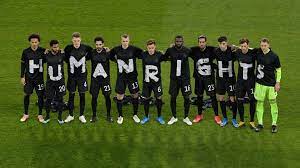May 12 – Following human rights protests by international players from Belgium, Denmark, Germany and Norway and letters from the Danish and Norwegian FA’s FIFA and World Cup 2022 organisers Qatar have begun a series of meetings with member associations.
The latest was a virtual meeting, May 10, with several (unnamed) federations and confederations who discussed issues around workers’ welfare reforms and human rights in Qatar.
Present from Qatar was Hassan Al Thawadi, general secretary of Qatar 2022’s organising body, the Supreme Committee for Delivery & Legacy (SC), as well as representatives human rights organisations and workers unions including Amnesty International, BWI, ILO, ITUC1.
A FIFA press release said the meeting “provided an opportunity to clarify a number of facts related to the country’s labour reforms programme, look at the important progress achieved since Qatar was awarded the tournament in 2010 and discuss the challenges that still remain”.
It is those remaining challenges that sparked the player protests in March during the international fixture window that saw the start of Qatar 2022 qualifiers in Europe.
In February a Guardian newspaper report highlighted that more than 6,500 migrant workers from India, Pakistan, Nepal, Bangladesh and Sri Lanka have died in Qatar since it won the right to host the World Cup in 2011. Not all the workers were working on World Cup stadia but a large majority were working on construction and infrastructure projects.
While the Qataris have moved to pass new labour laws and provide greater protection for workers, the concern has been over the speed at which the new reforms are being implemented. It is a debate the Qataris have not shied away from, at the same time asking for patience and commonsense as they implemented change in their country.
FIFA president Gianni Infantino welcomed the debate with member associations and emphasised the importance of providing safe conditions for workers engaged in 2022 World Cup construction projects.
“We all want to ensure the protection of everyone engaged in the delivery of the FIFA World Cup, and we are confident the event can serve as a catalyst for broader positive social change,” said Infantino.
He also acknowledged the scale of change taking place in Qatar and that the pace of change might not be as fast as some wanted but that any discussion needed to be based around information provided by those working in the ground.
“We know there is still work to be done, but we need to recognise the significant progress achieved in a very short time, thanks to the commitment of the highest authorities in the country, and to ensure that any debate on this complex matter should be based on verified facts,” he said.
“It is important for our member associations to hear directly from independent international experts that the conditions on the FIFA World Cup construction sites have reached the highest global safety standards, and that the recent landmark legislative reforms have already benefitted tens of thousands of workers across Qatar.”
FIFA said that the meeting clarified a number of facts related to Qatar’s labour reforms programme, and the progress achieved since 2010. It also stressed the lasting legacy the 2022 World Cup was providing in terms of workers’ welfare and human rights in the host country.
Both FIFA and Qatar’s Supreme Committee committed to “continue to engage with the global football community … to address any concerns that may arise.”
Contact the writer of this story at moc.l1752124367labto1752124367ofdlr1752124367owedi1752124367sni@n1752124367osloh1752124367cin.l1752124367uap1752124367

